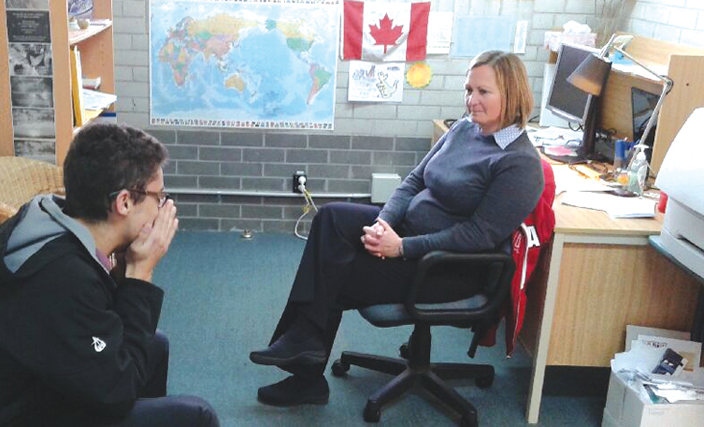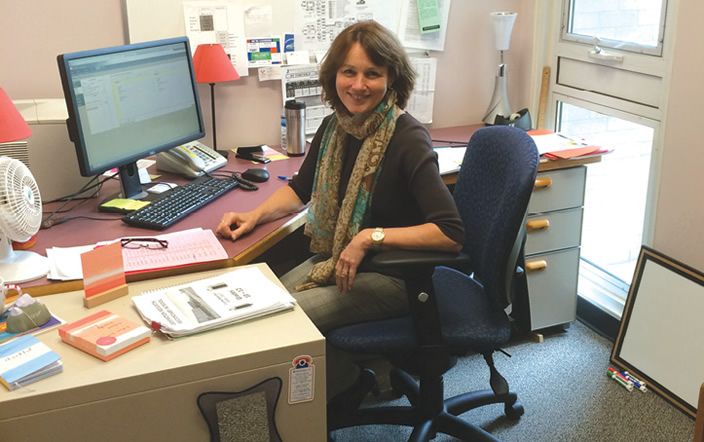“Making sure schedules work for kids is a huge task that takes up to 30% of a counsellors’ time. There are some advantages in that this gives you a chance to develop relationships with students and they may feel more comfortable coming to see you later about other matters.
“But in Australia I appreciate the opportunity to be dedicated to personal counselling, and having to do only that may allow me to delve further into their mental and emotional health concerns.”
Debbie said the school in Surrey is fast growing with 1450 students and three counsellors. Students are divided among counsellors on an alphabetic basis.
“The counselling role is similar to that in Parramatta Diocese as it typically involves individual counselling, psychoeducation, family support and the completion of behaviour related Individual Education Plans,” Debbie said.
“As you would expect, a substantial part of the role is to support students in their quest to pass their subjects. Some of the challenges for students include difficult home dynamics, poverty, mental health issues and refugee background.
“However, a notable difference in the counselling role is course planning and post secondary advice. As a counsellor, you are required to consult with students as they make course choices, keeping in mind their post secondary options as they reach the higher grades.
“This means that you need to have knowledge of admission requirements for post secondary institutions to ensure accurate advice is given. Tracy organised for me to attend some of the college and university information days that address these issues.
“Another difference between the two systems is that this Surrey school has various support staff allocated to it because it is designated as an inner city school – one which is characterised by poverty and related issues such as challenging mental health.
“These additional workers that provide wrap around student support include an Aboriginal youth care worker, youth care worker, youth educational support worker (provides food and inclusive activities), substance use liaison and safe schools staff.
“Obviously, an exchange situation calls for flexibility and new learning. While I have been comfortable in taking on the role of course planning, I wonder about it compromising the traditional counselling role.
“Teachers will ask that you discuss with a student their lack of attendance or their suitability for rigorous courses. Even when you couch this conversation in the best interests of the student, it could be seen to undermine the non judgemental and trusting nature of a counsellor’s relationship with a student.
“My counterparts in Surrey have echoed these thoughts in addition to the issue of time constraints when personal counselling time is taken up with course planning administrative tasks,” Debbie said.
Tracy said the HSC causes a deal of stress for students that is not experienced in Canada, where university entry is based on performance throughout the year and broad based admission requirements, without a Provincially administered final exam.
“This ATAR is significantly impacting on students’ emotional health. The Year 11 cohort of students is emotionally and educationally at risk and I have spent a great deal of time addressing their concerns as a result of the half yearly exams and first report card. But I expect that I will be seeing more Year 12 students in Term 3 as the emotional burden of the HSC takes over.”
Tracy is on her second exchange. In 2000 she was at MacKillop Catholic College Werribee as a teacher. She has since retrained as a counsellor.
“I appreciated the pastoral care that is provided to students in Catholic schools, the level of care for the students overall wellbeing is good.”
Debbie said: “I feel very fortunate that I continue to enjoy this opportunity to be immersed into another school system and culture. It provides invaluable professional experience and the chance to broaden one’s perspective on life.”
Debbie is also on a second exchange. She previously exchanged as a teacher to Windsor, Ontario. If you are interested in exchange, contact Helen Gregory at helen@ieu.asn.au.




































































































































